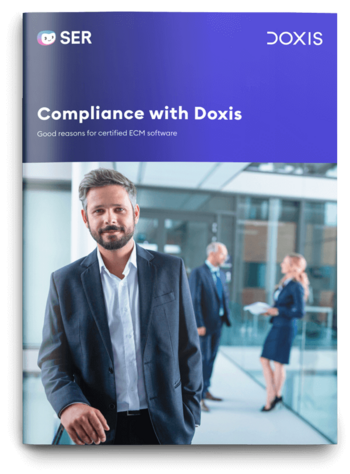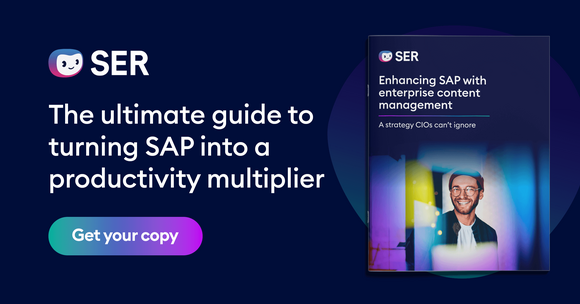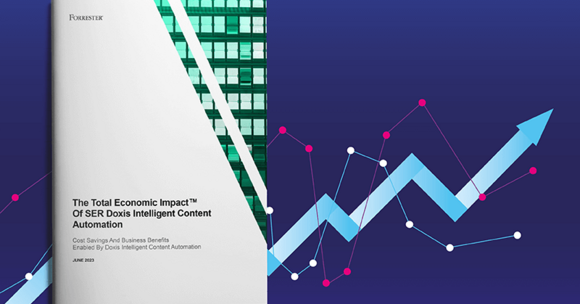SER Blog Information Governance
ISO 9001 certification
Customer-centric business processes in quality management systems
ISO 9001 is the most recognized quality management (QM) standard worldwide, outlining the basics of building an effective quality management system. Choosing an ISO 9001-certified solution means you’re meeting these standards and showing your commitment to continually improving processes and exceeding customer expectations. This ultimately boosts your business performance, saving you both time and money.
Keep reading to see when ISO 9001 matters for you and the benefits of using a certified system.

What is ISO 9001?
DIN EN ISO 9001—or ISO 9001 for short—is a voluntary standard for quality management systems issued by ISO, the International Organization for Standardization. It’s also known as ISO 9001:2015, in reference to the most recent update in 2015.
Think of it like a manual or guidebook that organizations follow to build and maintain a quality management system (QMS). The standard itself is a written document, available as a printed or digital text, outlining principles and practices an organization should use to ensure that their processes consistently meet customer and regulatory requirements. It’s used as a tool to design, assess and improve the way an organization operates, focusing on making their operations more efficient and customer focused.
The goal? To enhance customer satisfaction and create efficient processes. It does this through a set of guidelines, which form part of a wider family of contributory ISO standards:
- ISO 9000 specifies the terms and definitions used in ISO 9001.
- ISO 9001 specifies the requirements for a QM system.
- ISO 9004 contains guidelines for an ISO 9001-certified QM system.
How important is ISO 9001 in quality management?
The prime objective of quality management is to anchor consistently high quality in business processes. As the basis for this, ISO 9001 is relevant for all organizations, irrespective of scale or sector. ISO 9001 is a globally recognized standard that provides a framework for developing, implementing, maintaining and continually improving a quality management system within an organization.
The fundamental nature of the requirements defined in ISO 9001 means many organizations specify compliance as a condition for working with suppliers. In fact, entire industries use the standard as the basis for creating their own frameworks—e.g., ISO 13485 for manufacturers of medical devices.
In other words, the QM system requirements defined in ISO 9001 are relevant for both internal and external quality management processes.
Checklist: ISO 9001 quality management requirements
ISO 9001 explicitly contains the following core principles:
- Customer focus: Companies must focus on meeting customers’ needs and strive to exceed their expectations.
- Leadership: Leaders at all levels establish unity of purpose and direction internally, while defining market requirements externally, which are covered in a QM system.
- Relationship management: For long-lasting success, companies manage their relationships with all interested parties, such as suppliers and other external service providers.
- Engagement of people: It is essential for organizations that its people are empowered and committed to delivering value.
- Improvement: A successful company has an ongoing focus on improving its processes.
- Process approach: Efficient results are achieved more effectively when interrelated processes function as a coherent system.
- Evidence-based decision-making: Measures driven by data are more likely to lead to an effective outcome.
As the above makes clear, the quality management system requirements in ISO 9001 are not especially technical in nature. Rather, it’s about defining clear processes, assigning responsibilities and creating a culture of continual improvement.
ISO 9001 and document management
The versatility of ISO 9001 makes it suited to application in any number of business areas. One use case is document management, and in particular, document control. This refers to the organization of every aspect of documents—create, work on, manage and archive your documents over their entire life cycle. Documents in this sense are records of audits, reports, process descriptions, work instructions, etc.
Hey Doxi, what requirements does ISO 9001 define for document control?
- Appropriate documentation: Information is marked appropriately, legibly and with unique identification. For instance, a report is stored electronically as text and contains details such as the title, author and date.
- Information availability: Relevant information is available to authorized employees to use as and when they need it.
- Document protection: Document data is handled with integrity and treated as confidential. It’s just as important to safeguard appropriate use as it is to prevent accidental changes.
- Review: You must validate, evaluate and approve documented information prior to publication or distribution.
- Seamless documentation: All documents and associated processes are transparently documented, so you always know who is working on which document and when, can readily identify the current version, transparently digitalize your release processes, and compliantly archive inactive documents in line with audit requirements.
Document management with an ISO 9001-certified DMS
Companies that manage their documents digitally do so using one of two systems: a document management system (DMS) or an enterprise content management solution (ECM) with integrated DMS. Under ISO 9001, either would be considered a quality management system in your organization.
Certifications show if the system is ISO 9001-approved. Doxis has ISO 9001:2015 certification awarded by TÜV Rheinland. It provides assurance that Doxis meets national and international quality standards.
In other words, with Doxis you get a user-friendly solution that will standardize, scale and enhance the agility of your company-wide processes. Say goodbye to system boundaries, language barriers and interruptions in the user experience!
Here’s an example of ISO 9001-compliant document control using Doxis in practice:
- You digitalize your document control processes from end to end in Doxis.
- You control any number of documents, without ever losing track.
- You set up individual workflows and automate entire tasks.
- Doxis files and versions your documents, so changes are immediately apparent.
And with Doxis you control your documents across multiple systems with zero interruption in the user experience. For instance, Doxis will integrate directly into your existing ERP system via a dedicated interface, for assured document quality processes enterprise-wide.
The advantages of ISO 9001-certified software
A quality management system with ISO 9001 certification meets the highest quality standards and signifies compliance with security requirements at all stages of software development.
Why you should choose an ISO 9001-certified quality management system:
- Consistent quality: Simultaneously standardized and agile processes are your assurance of consistently high quality.
- Risk mitigation: Transparent development processes detect risks at an early stage for fast resolution.
- Enhanced efficiency: Optimized, clearly defined workflows reduce mistakes and rework.
- Better documentation: Quality management systems traceably store documents and make them readily accessible.
- Competitive advantages: Internationally recognized standards like ISO 9001 strengthen trust in your company.
An ISO 9001-certified QM system such as Doxis ultimately forms the basis for the highest levels of customer satisfaction—by enabling you to continually evolve your processes and keep customers happy over the long term. This is something the existence of your company depends on. With Doxis, you lay the foundation for your success.

Compliance with Doxis - Good reasons for certified ECM software
How a certified ECM solution helps you stay compliant and which legal requirements and standards you conform to with Doxis.
Read nowISO 9001 certification means exceeding customer expectations
ISO 9001 certification validates the high quality of products and services. Quality management systems certified to this standard underpin your company’s long-term success by structuring business processes to help your organization deliver on your customers’ expectations. You always stay flexible to respond to market requirements and meet, or ideally exceed, your customers’ expectations. Choose certified Doxis software and make the transition to secure, high-quality, customer-centric document processes—now and in future.
FAQs on ISO 9001 certification
The latest digitization trends, laws and guidelines, and helpful tips straight to your inbox: Subscribe to our newsletter.
How can we help you?
+49 (0) 30 498582-0Your message has reached us!
We appreciate your interest and will get back to you shortly.




